-
Rendez-Vous with French Cinema at Lincoln Center 2012

Rendez-Vous with French
Cinema 2012
To provide feedback to reviews and get day-to-day updates on screenings go to the Rendez-Vous Forums thread HERE.
Links to the reviews:
17 Girls (Muriel, Delphhine Coulin 2011)
18 Years Old and Rising (Fréderic Louf 2011)
38 Witnesses (Lucas Belvaux 2012)
Americano (Mathieu Demy 2011)
Delicacy (David and Stéphane Foekinos 2011)
Farewell, My Queen (Benoît Jacquot 2012)
Free Men (Ismaël Faroukhi 2011)
Gang Story, A (Olivier Marchal 2011)
Guilty (Vincent Garenq 2011)
Headwinds (Jalil Lespert 2011)
Last Screening (Laurent Achard 2011)
Louise Wimmer (Cyril Mennegun 2011)
Low Life (Nicolas Klotz 2012)
Moon Child (Delphine Gleize 2011)
Painting, The (Jean-Pierre Laguionie 2012)
Paris by Night (Philippe Lefebvre 2012)
Pater (Alain Cavalier 2011)
Screen Illusion, The (Mathieu Amalric 2011)
Smuggler's Songs (Rabah Ameur-Zaïmeche 2011)
Snows of Kilimanjaro (Robert Guédiguian 2011)
Unforgivable (André Téchiné 2011)
Well-Digger's Daughter, The (Daniel Auteuil 2012)
Rendez-Vous with French Cinema 2011 at Lincoln Center: Press screening schedule
(WRT=Walter Reade Theater, Lincoln Center, IFC=IFC Center, Sixth Ave. @ 3rd St.)
The press screenings schedule was announced Feb. 8, 2012 and is as foillows:
Monday, February 13
NO SCREENINGS
Tuesday, February 14
9AM – SMUGGLER’S SONG (97 min) - WRT
11AM - THE SCREEN ILLUSION (80 min) - WRT
Wednesday, February 15
10AM – THE WELL-DIGGERS DAUGHTER (107 min) - IFC
1PM – FREE MEN (99 min) - WRT
3PM – AMERICANO (105 min) - WRT
Thursday, February 16
10AM – THE SNOWS OF KILIMANJARO (107 min) – IFC
Friday, February 17
10AM - THE PAINTING (76 min) - IFC
Monday, February 20
NO SCREENINGS
Tuesday, February 21
9AM – THE LAST SCREENING (81 min) - WRT
10:45AM – DELICACY (108 min) - WRT
Wednesday, February 22
9AM - 38 WITNESSES (104 min) – WRT
11AM – 18 YEARS OLD AND RISING (96 min) – WRT
Thursday, February 23
9AM - FAREWELL, MY QUEEN (100 min) – WRT
11AM – 17 GIRLS (90 min) - WRT
Friday, February 24
10AM – UNFORGIVABLE (113 min)– WRT
Monday, February 27
10AM – PATER (105 min) - IFC
Tuesday, February 28
9:30AM – LOW LIFE (120 min) – IFC
Last edited by Chris Knipp; 03-10-2015 at 10:41 PM.
-
Rabah Ameur-Zaïmeche: Smuggler's songs (2011)
RABAH AMEUR-ZAÏMECHE: SMUGGLER'S SONGS (2011)
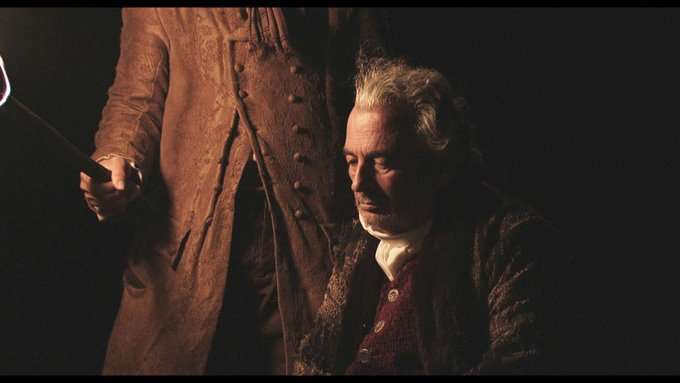
JACQUES NOLOT IN SMUGGLERS' SONGS
Mid-eighteenth-century followers of the French Robin Hood
Smugglers' Songs/Les chants de Madrin, Rabah Ameur-Zaïmeche's fourth film, is an atmospheric and musical evocation of the pre-revolutionary spirit of mid-eighteenth-century France and of the period outlaw hero and French Robin Hood Louis Madrin. Madrin defied the fermiers généraux, the rapacious tax collectors for the King who had grown immensely rich and were widely hated for the way they were exploiting the whole country. He stole and sold goods cheap in illegal markets. His brutal torture and execution made him a national revolutionary martyr.
The film joins a band of Madrin followers after their hero's death. Zaïmeche himself plays Bélissard, the de-facto "chef" of this band though he says there is no "chef." We first meet a handsome young deserter who has been shot by the military who wanders across a field and collapses. Bélissard rescues him and later recruits him after shooting and killing three soldiers who come to get the young man. Then the scene shifts and we join an anti-establishment aristocrat, the Marquis de Levezin (a fine Jacques Nolot) who had become close to Madrin and is now engaged in writing his biography. The Marquis gives a ride in his carriage to an itinerant book peddler or colporteur (Christian Milia-Darmezin). This man is well acquainted with the Madrin contraband markets, and through him the Marquis finds his way to the friends of his hero.
The smugglers carry on Madrin's spirit, defying and fighting off the tax collectors' army, selling contraband. They collect songs in honor of their hero and get them published and distributed to the public (sometimes along with the 1001 Nights, in its unexpurgated form). Their spirited and well-armed band sets up temporary markets on the edges of villages. There they hastily sell tobacco, silk, and precious objects to willing buyers as well as books, including works by Jean-Jacques Rousseau and Voltaire, and the Marquis travels with them The colporteur joins up too, selling books and transporting the song collection. He gets captured and imprisoned and nearly despairs, but is rescued in a bold attack by Bĺissard and his band.
The anti-establishment tone is set in the opening scene. It's pretty clear who the good guys and the bad guys are. Bias aside, Smugglers' Songs is atmospheric and pleasant, far from the usual costume drama and, in its ideological bent, a little like Rossellini. The focus is on lifestyle and spirit rather than an action-picture story line. The cinematography by Irina Lubtchansky brings out the nice costumes by Christiane Vervandier and the natural landscape; no set design needed, since nearly all scenes are set outdoors. Several sequences are beautifully shot entirely in silhouette, an effect that suggests events being transformed into legend in the eyes of the beholder. There is impressive musketry and handsome horseflesh and the regular musical interludes (arranged by Valentin Clastrier) make use of violin, flute, and a curious cranked instrument. It's all about the atmosphere and the camaraderie, despite some violent episodes when the military step in and must be repelled.
There's a notable sequence that further emphases the legend-making enterprise when Bélissard meets with anti-establishment printer Jean-Luc Cynan (Jean-Luc Nancy) to get the pro-Mandrin songs editioned and this also turns into a little lesson in period typesetting and papermaking: the wooden pulp-working machine in particularly is a marvel to behold in operation. There is a sophisticated sense of period here, but those hoping for the excitement of an action film may become uneasy at this point. Zaïmeche is in no hurry. One has the distinct impression that the filmmakers were having fun. There is much laughter on screen.
The spirit of Madrin hovers over events, and the climax shows the band and a group of pretty women indoors for once while the Marquis delivers the words of the famous "Complainte de Madrin." Set to music from an opera by Jean-Philippe Rameau, the "Complainte" casts Madrin as a national hero, looking out on all of France as his unjust end approaches. In it, Madrin speaks of his robbery and selling and capture and execution and ends with the plaintive, elegiac lines, "Compagnons de misère/Allez dire à ma mère/Qu'elle ne m'reverra plus/J' suis un enfant, vous m'entendez,/Qu'elle ne m'reverra plus/J'suis un enfant perdu.""Companions of misery/Go tell my mother/That she will see me no more/I'm a child, you hear me,/That she won't see any more/I am a lost child." More than a dozen interpretations of this very famous song (including a period one from Le Chat Noir and a moving rendition by Yves Montand) will be found here.
Smugglers' Songs exudes a gentle French "after May" spirit here of 1968 -- the year in fact that Zaïmeche was brought from his native Algeria to France, at the age of two. "Revolt meets poetry," one French review summarizes; "an alliance between a quasi-insurrectional theme and a very sweet tone," says another. There are killings and three armed encounters (which the Mandrin-followers win against the army of the King and the tax collectors) but a gentle, humanistic sprit reigns: there is a lot of hugging and pauses to play music and hints that these men living off the land are eco-warriors who've gone green long before the creation of the Sierra Club.
This film won the Jean Vigo Prize, an award that itself tends to favor eccentric and revolutionary work. A similar recent winner was Serge Bozon's La France, an even more eccentric and less strictly historical film, also full of musical pauses, also set outdoors, about a World War I band of deserters and a woman posing as a man hunting for her soldier husband. Les Chants de Mandrin may be less appealing to avant-gardists but it is more accessible and pleasant. It debuted at the Locarno festival August 11, 2011 and entered French theaters January 25, 2012, receiving generally favorably reviews (Allociné 3.6).
Smuggler's Songs is part of the joint UniFrance-Lincoln Center Rendez-Vous with French Cinema, March 1-11, 2012. The film was shown to press and industry at the Walter Reade Theater, where it was screened for this review. Public screenings:
*Wed., March 7, 9:30pm – IFC; *Thurs., March 8, 6:15pm – WRT; Fri., March 9, 1:30pm - WRT
*In person: Rabah Ameur-Zaïméche
Last edited by Chris Knipp; 02-26-2012 at 08:05 PM.
-
Matthieu Amalric: The Screen Illusion (2011)
MATTHIEU AMALRIC: THE SCREEN ILLUSION (2011)
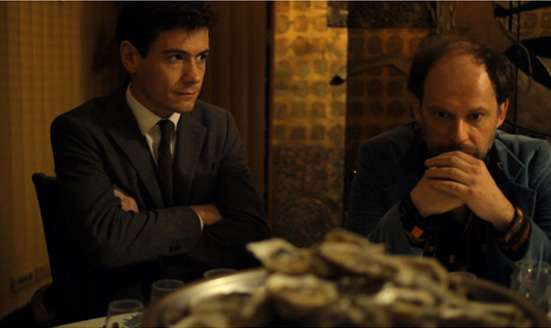
LOÏC CORBERY AND DENIS PODALYDÈS IN THE SCREEN ILLUSION
Youthful Corneille as a cool crime drama, for television
Amalric's Screen Illusion/L'illusion comique is a shortened modern dress for-TV adaptation of the play written in 1636 by the French playwright Pierre Corneille. It's the third in a series commissioned by the Comédie Française using only their actors doing plays they've been performing on stage, made away from the theater in an original format in only twelve days, and requiring that for the revised text words may be cut, but not altered or added to. The previous two adaptations were by Claude Mouriras, and by the team of Olivier Ducastel and Jacques Martineau.
L'illusion comique uses a play-within-a play structure with an interestingly modern and Nabokovian twist: one man actually watches a play, deluded into thinking it is a privileged version of the real. L’Illusion comique runs through a gamut of genres that sound like Polonius speaking of the players: pastoral followed by comedy with a farcical character at the center, followed by tragicomedy – it’s a dramatic tour de force in which Corneille, still early in his career at 28 and just starting to become famous, shows himself to be already at the top of his theatrical game. Or so Wikipedia says. It's a youthful work. But it's notably adventurous and ahead of its time and surreal, and that makes it good material for a modern transformation. And perhaps safer for Amalric, not to be risking accusations of mangling an absolute top classic, even if it's by one of France's greatest playwrights.
This is a seventeenth-century play in alexandrine couplets. That has not changed in the least, though the actors, who are trained to perform the lines on stage, deliver them with maximum fluency, and adapt to the modern settings and reinterpretations like the consummate pros that they are. The visuals are consistently and realistically modernized -- set in the present time and mostly based in the posh Hotel du Louvre, with farcical scenes in the rooms, and other action at a parking garage, a shootout happening on the roof, and a nightclub confrontation when reality finally replaces illusion. But the language remains the same as it was.
To begin with Pridamant (Alain Lenglet) has lost track of his son Clindor (Loic Corbery) for a decade and desperately misses him and (in the original) enlists a magician Alcandre (Herve Pierre), to help him see where his son is and what he is doing. The magician in this version is replaced by a concierge/security guard/detective at the hotel, and the magic visions are replaced by a battery of security camera screens and cassettes that Alcandre shows to Pridamant. The important thing is that Amalric finds something cinematic -- and perhaps also telivisory, as an equivalent, particularly, with the security cameras and screens. But I honestly did not on one viewing know the play well enough or follow this filmed-for-TV version with sufficient understanding to appreciate the transformation. It seemed a little like slight of hand to me, a series of assumptions we agree to go along with that may not in the end be all that convincing. How stupid or gullible is this Pridamant? We do not, of course, watch everything on CCTV monitors. We get a glance at one, or at a playback, and then we shift to the actors in the rooms, and have to pretend Pridamant is, what? still watching the monitor? Amalric expects us to take big leaps here, and it's all just as artificial as alexandrines or as a 17th-century play performed in 17th-century costume.
Clindor is working for a video game exec Matamore (Denis Podalydès), the man behind "Modern Warfare 2." In the original Matamore is a boastful military officer. Matamore claims to adore Isabelle (Suliane Brahim), but her father Géronte (Jean-Baptiste Malartre) plans for her to marry Adraste (Adrien Gamba-Gontard). Meanwhile Cindor and Isabelle are in love with each other. But another woman, Lyse (Julie Sicard), is opposed to this relationship because she is in love with Clidor too and wants him for herself.
Clindor is attracted to one woman but desirous of the other because she has the wealth and the power he wants. And he flirts with additional ladies. And other people are plotting whom he should be hitched to. The play is more complicated in the original than this simplified version: Amalric has cut out subplots. The main lines are easier to follow on screen thus simplified, but at times a scene seems to lack a proper introduction. And it can be hard to follow the basic action as well. I felt as I do at the opera, which is to say out of my element.
Nonetheless one can see Corneille himself as the magician; and Amalric as a meta-magician in transforming the play into a still more stylized modern version that reinvents something quintessentially theatrical into something set out in a realistic modern world. And in turn the actors, who were peroming the play in its more traditional mise-en-scène on stage every day at night while shooting the film version during the day, perform prodigies of imagination and energy and collaboration of their own. In an interview on stage at Rotterdam Almalric described the cast as his collaborators.
A Screen Daily article suggests comparing this reworking of Corneille to Michael Almereyda’s 2000 "slacker" Hamlet . Yes, but we know Hamlet and we don't know this play. As English speaking viewers we are lost.
We could compare Ralph Fiennes' current filmed updated Serbian Coriolanus, which is so realistic and gritty (it took more than 12 days and a lot of explosions, more I think that were necessary) with its tattooed serbian hunks, and Fiennes' performance is so in-your-face, you forget, at key moments anyway, that you're listening to Shakespearean English, or cease to care. Not sure that happens with Corneille's 17th-century French here, but it might happen for French viewers and not for us.
Amalric is a supremely intelligent and thoughtful actor and director, but his directorial projects have not been as good as his acting, so far. His On Tour/Tournée (SFIFF 2011,done only a little before this project) was ecstatically received in France, but seemed contrived to me, and Screen Illusion seems another fascinating idea that unfortunately fails to engage us as fully as it engaged Amalric. But my respect for Amalric remains enormous.
L'Illusion comique AKA The Screen Illusion, was screened for this review at a press and industry showing at the Walter Reade Theater of Lincoln Center. The film, only 77 minutes, made for French public television, will be included in the 2012 joint UniFrance and Film Society of Lincoln Center presentation, The Rendez-Vous with French Cinema Today. The public screening schedule will be as follows:
*Sun., March 4, 6:15pm – WRT; *Sun., March 4, 9pm – BAM; *Mon., March 5, 8pm – IFC; *Tues., March 6, 4pm - WRT
*In person: Mathieu Amalric
Last edited by Chris Knipp; 02-16-2012 at 04:51 PM.
-
Daniel auteuil: The well-digger's daughter (2011)
DANIEL AUTEUIL: THE WELL-DIGGER'S DAUGHTER (2011)
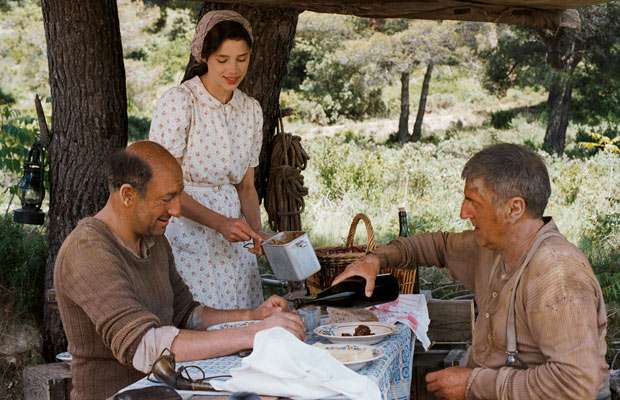
MERAD, BERGÈS-FRISBEY AND AUTEUIL IN THE WELL-DIGGER'S DAUGHTER
Auteuil brings back Pagnol
Old fashioned, arguably retro values dominate Auteuil's Pagnol remake The Well-Digger's Daughter/La Fille du puisatier, a story of bad fortune reversed and meanness turned into decency. Nothing earth-shaking here, but the kind of movie that leaves mainstream audiences feeling good. There is an affirmation of simple country values and a look at the issues of class and illegitimacy and the vicissitudes of war. This version adheres closely enough to the 1940 original, but despite the well-digger and his assistant's preserving their heavy Provençal accents, otherwise the film is less naturalistic and more mainstream than the original, also glossier and better looking, with higher production values. Do we need this done over again? Somebody obviously thought so.
Auteuil's return to Pagnol material marks the twenty-fifth anniversary of his debut in the two-film Pagnol novel adaptation of Jean de Fleurette and Manon of the Source (directed by Claude Berri), a French series hugely successful with US art house audiences. This time it's the now 62-year-old actor's show: he stars, wrote the adaptation of the original film, and directed. And he has made the well-digger Pascal Amoretti's character even stronger -- and more intensely conflicted -- than the blocky, gruff figure embodied the first time by Raimu.
The story's pretty simple. Amoretti calls his titular 18-year-old daughter Patricia (Astrid Bergès-Frisbey) back from being educated by nuns in Paris to take care of his five other younger daughters in Provence. Her good looks and manners and proper French much attract Jacques Mazel (Nicolas Duvauchelle), the putatively dashing pilot son of M. Mazel (Jean-Pierre Darroussin), the rich local owner of a hardware store. A couple of dates and rides on a motorcycle get Patricia pregnant. She has fallen for Jacques, but the war's breaking out and Jacques is off to the front, and so is Pascal's simple, good-humored assistant Félipe (Kad Merad), who wanted to marry Patricia before this happened. Mazel senior and his ditzy, hysterical wife (comedic vet Sabine Azéma) are not friendly when Pascal comes with all his daughters to inform them of Patricia's condition and the fact that their son is responsible. Then Jacques is shot down and they are devastated. And things change, and change again.
Darroussin adds an authentic severity to his part; Azéma and Merad are a little too light and comedic, and Azéma really overdoes it. The formerly bad-boy Duvauchelle is a bit too low-key: he's more slinky and creepy than really dashing here, alas. Bergès-Frisbey has a delicacy and sensitivity that are good for the role of Patricia, but she's also a bit bland. In truth though the story line is so simple, involving, and well worked out than no one actor, or character, is crucial. Auteuil does not hesitate to make his role and performance even more central, creating a Pascal more solid and intense than Raimu's 1940 version. Auteuil's Pascal is violent and almost cruel with Patricia when he thinks he must abandon her cause, and melting and sweet when he has a change of heart . His big encounters with M. and Mme. Mazel are peculiarly emotional and dramatic. He winds up being the most interesting actor to watch, but he keeps the cast and the tone nicely balanced (with the slight exception, again, of Azéma).
As is usual with Pagnol, the south of France material is warm and humanistic, and is a time capsule, a portrait of cultural values much changed since. With its bell-ringing musical background, the London Symphony strings coming in at appropriate touching moments and the super-happy ending, this is a movie that offers little for sophisticates. But its still a good story well told and like those earlier movies it's likely to delight the segment of the art house audience that is looking for charm rather than edginess. Those who can't wait for the film's summer 2012 US release can watch it during the Lincoln Center-UniFrance Rendez-Vous with French Cinema series. And the producers were so pleased with Auteuil's handling of this Pagnol outing, they hired him to do the earlier Pagnol film trilogy, Marius, Fanny and César, which will come out later this year.
This film opened in Paris to generally good reviews, which approved Auteuil's directorial debut and were justifiably impressed by his own strong performance. Knowledgeable observers however still consider the Pagnol originals, overall, superior. And there is no denying, and some French critics affirmed, that this is very far from being a fresh and exciting new work or approach.
La Fille du puisatier will be released by Kino Lorber in the US in the summer of 2012. It is also part of the Film Society of Lincoln Center-UniFrance Rendez-Vous with French Cinema series for 2012 and was screened for press and industry, when it was observed for this review. The series runs at several venues in New York City from March 1-11. Public screenings for this film are:
*Thurs., March 8, 8pm – IFC; *Sun., March 11, 3:45pm – WRT
*In person: Jean-Pierre Darroussin
Last edited by Chris Knipp; 02-14-2016 at 08:57 AM.
-
Ismaël Faroukhi: Free Men (2011)
ISMAËL FAROUKHI: FREE MEN (2011)
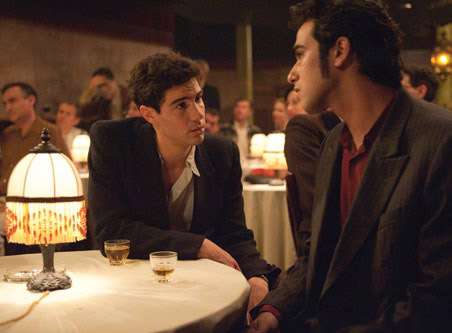
TAHAR RAHIM AND MAHMOUD SHALABY IN FREE MEN
Muslims and resistance in German-occupied Paris
The young star of Audiard's amazing 2009 A Prophet/Un prophète is back in the 2011 Free Men/Les Hommes libres, a film about a young Algerian in Paris in 1942 inspired to join the resistance by his friendship with a Jewish man. In 2009 Tahar Rahim won Best Actor at the French Césars; A Prophet won the Grand Prix at Cannes. Free Men again gives the young Rahim the central role. This is two or three films. Again, it sets up Rahim as a young man being formed into something stronger. Come from Algeria to work in a factory, his Younes got TB and recovered but lost his job. As a black marketer getting by, he's caught in a raid and recruited at police headquarters where it's believed the muslims are issuing false documents.
But this is also indirectly a biopic about Si Kaddour Ben Ghabrit (played by the venerable and monumental Michael Lonsdale of Beauvois' Of Gods and Men and many other great films), founder and rector of the Great Mosque of Paris, who aided the anti-Nazi resistance. It's the story of the resistance, of which Younes becomes more and more a part. The friendship that leads him to want to help protect Jewis is with Salime, a superb Algerian singer and musician, reputedly the best in Europe, who turns out to be Jewish. While Jews and Arab Muslims are seen as at each other's throats, it is interesting to learn that their twin outsider status made them allies in Paris under the Vichy government.
Des hommes libres is also a celebration of the marvelous Arab music of the period, and its musical interludes are the highlights of the film and symbolize music's power to transform and unify and transmit culture, even under the most repressive conditions of German occupation.
And Les hommes libres' undercurrent is the birthing of the Algerian independent movement, which all the Algerian political activists in Paris at this time are aware of and involved in, and which gains great impetus by the Liberation, which made the Algerians see allies in the Americans and their own liberation from French colonial oppression in the liberation of the French from Nazi occupation.
The essentiality of Free Men is that it represents an unrecognized story of a role played during the war by maghrebins, North African Arabs, in the attempt to save Jews from Nazi extermination. It's another story that needed to be told and it's an interesting one. After all, France has the biggest muslim population of any country in Europe. They matter. And the Algerians' relationship with the French is a complex one.
Tahar Rahim again has the role of a tabula rasa, a young man of little personality or character who is changed by strong events as he was changed by prison in A Prophet and by his association with the Corsican capo played by the great Niels Arestrup in Audiard's film. Little by little Younes, who spends more and more time at the mosque to satisfy his Vicny police handlers gives up trading on the black market. He does it for profit, and then begins to care.
The singing of the charismatic, popular and blue-eyed Salime Halali delights Younes. He also is attracted to Warba Shlimane alias Leila (Lubna Azabal of Incendies), who turns out to be a communist activist in hiding, and he saves a couple of Jewish children turned over to him where he lives. The Grand Mosque Rector is increasingly menaced by the Nazi officer Major von Ratibor (Christopher Buchholz), whom he wards off with deftness and aplomb.
Free Men is an interesting picture of historical events, but its meandering structure is in search of driving central action or more intense development on the part of Younes, a composite character created to pull together all the action of muslim resistance volunteers gathered around the other specific historical figures. It's going to be hard for Tahar Rahim to get another role as strong as the one he played in A Prophet -- unless he can work with Audiard again or someone of his caliber. Israeli-Arab actor Mahmoud Shalaby, who plays Salime, seems promising. Unfortunately the writing falls short. Two many paths in too many directions.
Too bad, because this is a worthy subject and Free Men has its own unique atmosphere of an unseen world inside occupied Paris. The film sings literally and figuratively during the passages of live musical performance. When an actor playing great Egyptian singer-songwriter Mohamed Abdel Wahab, thin and in dark glasses, appears performing with Salime at a cafe, it recreates a magic moment for fans of modern Arabic music.
Les Hommes libres opened in Paris September 28, 2011 to fairly good reviews (Allociné 3.0) that recognized an honest effort, but some spoke of "missed opportunity" and a plot and a too diffuse plot. It's a "modest recreation" -- perhaps too modest. But this is not a dead end for Rahim, who has been in Kevin Macdonald's The Eagle; will be in Lou Ye's Love and Bruises; and in another shot during the Turnisian revolution. He describes himself in an Inrocks interview: "I continue to grow. I'm finding a focus for my anxiety."
Free Men was observed at a press and industry screening for this review in preparation for the Rendez-Vous with French Cinema, the joint festival of the Film Society of Lincoln Center and UniFrance, March 1-11, 2012. Public screenings:
Fri., March 2, 1pm – WRT; *Sat., March 3, 9:15pm – WRT; *Sun., March 4, 4pm - IFC
*In person: Ismael Ferroukhi and Tahar Rahim
Last edited by Chris Knipp; 02-16-2012 at 04:50 PM.
-
Mathieu Demy: Americano (2011)
MATHIEU DEMY: AMERICANO (2011)
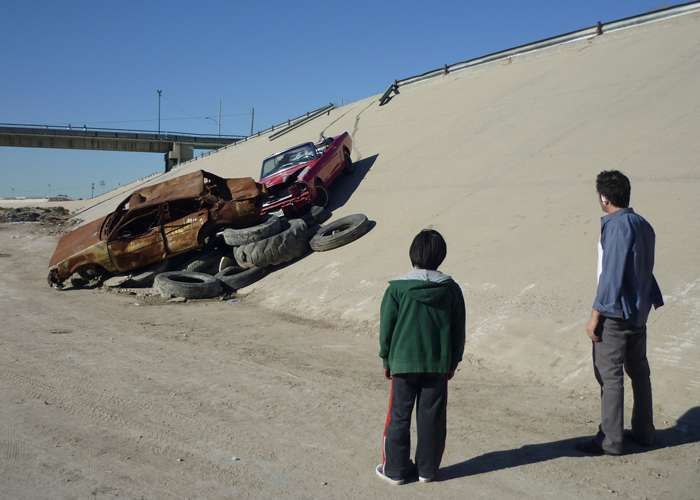
A man seeks his lost youth in America
This directorial debut (in which he is the protagonist) is by the son of two French cinematic icons, Jacques Demy and Agnès Varda, and it contains elements of both of them, a documentary quality from his mother and a romantic idealism from his father. The mysterious woman Martin (Demy) stalks in a Tijuana dive has the name of Jacques Demy's glamorous object of desire played by Anouk Aimée, Lola. Martin's girlfriend in Paris is played by Jacques' muse Catherine Deneuve's daughter, Chaira Mastroianni. Martin's exploration of his childhood is illlustrated with actual clips of Documenteur, a film by Varda showing her with a childhood Mathieu. And with these credentials, this film was well received by French critics and richly resonant for French audiences. But it may seem pretty sketchy and unsatisfactory to American audiences. Selma Hayek adds sexiness as Lola, and Geraldine Chaplin plays a family friend. Images are shot in a grainy, hot-colored 16mm, and music is supplied by Georges Delarue. The mixture of elements here is both haunting and disappointing. The film was acquired at Toronto for US distribution by MPI.
As Americano begins Martin learns that his mother has died in Venice, California. A dual US-French citizen who now sells real estate in Paris with a not very committed relationship with his girlfriend, he decides to go back and sell his mother's place and clear up her things, arranging for her body to be sent back to France for burial. He harbors lingering resentments against her out of a sense of abandonment. She had a nervous breakdown when he was of eight, when his father (director, actor, screenwriter Jean-Pierre Mocky) left her and took the boy to live permanently in France. Martin arrives in L.A. and is met by the annoying Linda (Chaplin), a friend of his mother who insists she was a joyful person and not the depressive Martin has always imagined. Throwing things out, Martin finds an old photograph that shows him as a child with a Mexican girl he used to play with. A returned letter from his mother indicates this Lola was the one his mother wanted to leave her place to and an American lawyer has told him a deceased person's inheritance wishes should be met. He then grabs Linda's red Mustang convertible and goes hunting for Lola.
The rest of the film is a sequence of vicissitudes in which a dogged Martin pursues the actual (or is she?) Lola, whom he played with as a child twenty-five years ago, and mentally explores his lost early childhood. She denies the past and he is repeatedly rebuffed by a heavy called Luis (Carlos Bardem), who beats him up. A boy who has directed Martin to the club called Americano where Lola is a pole dancer does not prevent Linda's red Mustang from being stolen, and with it Martin's money and passport. He is not in very good shape. He keeps calling Claire (Mastroianni) from pay phones, which she finds odd: he has never been that loyal and their relationship had reached an impasse.
This film in retrospect has, certainly, many suggestive elements, but it didn't work very well in the actual unreeling. The various elements do not hang together well enough and the protagonist is hard to get a grip on. As the glamorous, sexy, but scarred Mexican babe, Selma Hayek has a certain attraction, but the flashbacks are arbitrary; events including a snowy burial in France seem unrelated, Geraldine Chaplin (perhaps happily) forgotten, Chiara Mastroianni just an occasional flicker at the end of a phone line. It is difficult to make a story out of a void, and Demy's Martin has been estranged from his mother for much of his life (though his dual background has left him bilingual).
The film debuted at Toronto in September 2011, and opened in Paris November 30 to generally favorable reviews, though one French critic remarked that nothing is more frustrating than a road movie that leaves the viewer on the road. The iconic elements that go into the film as well as the sun-drenched American images of Venice, California and Tijuana may resonate with any audience looking more for atmosphere than structure.
Americano is a part of the Rendez-Vous with French Cinema, March 1-11, 2012, staged by the Film Society of Lincoln Center and UniFrance. Public screening schedule:
*Sat., March 3, 6:30pm – WRT; *Sun., March 4, 6:45pm – IFC; *Tues., March 6, 7:30pm - BAM
*In person: Mathieu Demy
Last edited by Chris Knipp; 02-16-2012 at 04:49 PM.
-
Robert Guédiguian: The Snows of Kilimanjjaro (2011)
ROBERT GUÉDIGUIAN: THE SNOWS OF KILIMANJJARO (2011)
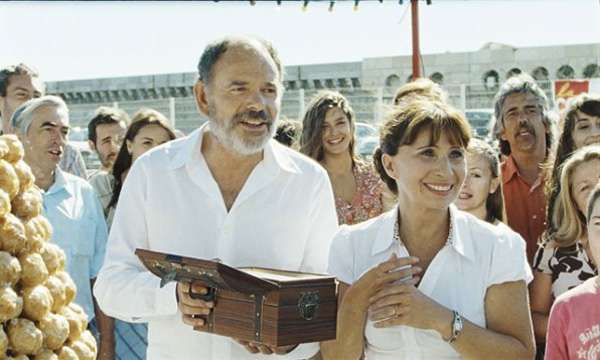
JEAN-PIERRE DARROUSSIN AND ARIANE ASCARIDE IN THE SNOWS OF KILIMANJARO
Tell what you know: Marseille, early-retired dock workers, and the social contract
This is a film in which French Armenian filmmaker Robert Guédigian does what he does best: a warmly humanistic film about socio-economic issues. If the Dardenne brothers always made films using a cast of old friends and family and set them in the same warm Mediterranean setting, you'd get the Guédigian of The Snows of Kilimanjaro.
It's all a little too good to be true, but the filmmaker's working methods are so smooth and his regular cast members, many his friends, are so adept and so appealing the messages go down easy and warm the heart. The basic one: people's actions are explainable by social and economic causes and not due to moral or personality defects.
Michel and Marie-Claire (Jean-Pierre Daroussin and Ariane Ascaride) are "middle-class, but not completely," they agree. They live on the cusp between complacency and anger so they can see the possibility of either mood. They can sit on their balcony enjoying the sun in the late afternoon and they own the place where they live. But they know how hard it was to get there. Marie-Claire gave up nursing school years ago and takes care of an old lady and Jean was forced into early retirement from his dock worker job. A union rep himself, he conduced a drawing to lay a group of people off and put his own name in the box.
A big joyous party takes place to sweeten the pill Jean has chosen to swallow. It's so naturally and wonderfully staged (packed with the director's regulars and friends) that you wish you could be there. Present are Jean's coworkers and some of those laid off, Jean and Marie-Claire get a present: a box of cash, and tickets for a two-weak trip to Kenya. Also Jean's best buddy since childhood Raoul (Gérard Meylan) gives him a comic book he used to own that disappeared, the first one he every bought. The couple start getting ready for the trip. Jean, unwilling to learn the "colonial" language, English, starts studying Swahili.
Not long afterwards Jean, Marie-Claire, Raoul, and his wife Denise (Marilyne Canto) are having an evening of cards when a couple of young masked men break in with pistols, tie them up, and take the money from the party as well as the tickets and their credit cards. One of them goes off with the comic book. Denise is very traumatized. Jean gets knocked over and his shoulder gets injured.
One of the bad guys turns out to be one of the laid off guys. The way all this is resolved has policier elements, and also some intense speeches that explain opposing points of view. Because the filmmaker's working methods are so smooth and natural, it all goes down easy. Having recently seen only Guédiguian's noirish thriller Lady Jane (SFIFF 2008) and his WWII historical film about foreigners involved in the French resistance, The Army of Crime, which like this employs Grégoire Leprince-Ringuet, and it's been quite a while since I saw his social portrait The Town Is Quiet (2000), I was not really aware of how winning the director is when working in every sense on his home turf. (But from French reviews, even they had tended to take him for granted and forget how "essential" he is.) There is a great deal of warmth here, a great many home truths, plenty to think about. It's almost as if Brecht were a real charmer, and his characters turned to you and gave you little lectures, but totally in character, as if they were not theatrical devices but real people really talking to you.
Christophe (Leprince-Ringuet) has two little brothers. Eventually Marie-Claire tracks down their mother, and she explains vociferously why she's left them in the 22-year-old now out-of-work Christophe's care. In a word: men. Nobody is wrong here. Even the police commissioner (played by the interesting Robinson Stévenin) who helps Jean with his problem is basically nice. As mentioned it's a little too good to be true; but it's not too good to be both enjoyable and instructive, dulce et utile. This is an unusually a fine piece of committed cinema. Because the points made are straightforward and clear does not meant they aren't true. Probably the best made and most valuable film in the 2012 Rendez-Vous press screenings so far.
Les Neiges de Kilimanjaro debuted at Cannes May 2011, and opened in Paris November 16, when it was enthusiastically received by the capital's generally left-leaning critics (Allociné 4.1).
This film is included in the joint UniFrance-Film Society of Lincoln Center presentation series from March 1-11. Public screening schedule:
*Tues., March 6, 7:45pm – IFC; Thurs., March 8, 1:30pm – WRT; *Sat., March 10, 9pm – WRT
*In person: Jean-Pierre Darroussin.
Last edited by Chris Knipp; 03-27-2012 at 07:03 PM.
-
Jean-françois laguionie: The painting (2011)
JEAN-FRANÇOIS LAGUIONIE: THE PAINTING (2011)
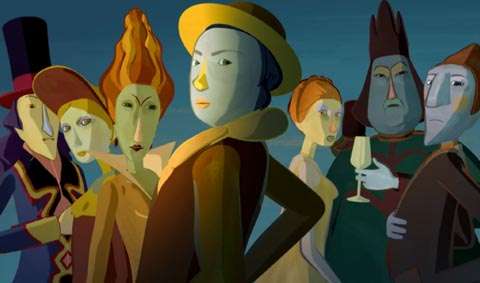
SNOBBISH "FINISHED" FIGURES IN AN UNFINISHED PAINTING
A hierarchy of creation leads to a painting revolt
From veteran French animator Jean-François Laguionie (of A Monkey's Tale; Gwen, the Book of Sand; and other films) comes The Painting/Le Tableau, a lush 76-minute animated feature focused on figures in a painting. The artist has left some of them unfinished, abandoning the canvas for years. And in the interlude a caste system has developed. The Toupins or "all painted" people lord it over the Pafinis, the "not finished," excluding them from the chateau. As for the Rofs, the merely "sketched" -- lines without color who have trouble finishing their sentences -- these the "all painted" ones treat as worthless and try to destroy. And so there is a hierarchy of creation in which some believe themselves more favored and use an aesthetic basis for their exclusionary policies. Yet what did the artist intend? Is he finished? Or will he return? These ideas form the basis for a somewhat meandering philosophical tale. They are so suggestive and the images so beautiful perhaps it's inevitable the results fall a bit short of our expectations. We can also perhaps forgive the story for wandering away from its main themes at times in search of pure adventure or visual stimulation.
Eventually we follow a few main characters on a journey that leads outside their canvas and into other ones, beyond to the dingy studio, and finally outside in what we might call the “real world,” where the most adventurous Pasfini finds the now venerable white-bearded painter. As we might have expected, in old age he has turned to simple landscapes en plein air, because it's "less difficult." It seems from a tour of the studio that he became Picasso, and then Miro or Mondrian, and now he is late Braque.
There are the inevitable amants maudits, the star-crossed lovers. Ramo, a Toupin youth in love with a Pasfinie girl, rejects the discriminatory system and wants to lead a revolt. Driven out of the chateau, he and Plume (a Rof) and Lola, a bold and confident Pasfinie, go in search of the artist. They explore the over-lush garden outside and brave the menacing forest and then, if they can escape the limits of the canvas itself, who knows? They may find find the artist and persuade him to finish his work. But before that they enter, half by accident, the worlds of several other paintings.
The theme offers the opportunity for play with styles and color. In a sense that's what it's all about. For some of us Rofs like "Plume" who are only a few lines may be more appealing and suggestive than the conventionally painted, old-style Toupins.
In the studio the explorers meet a large and langorous nude, once the artist's mistress. They also make their risky way into a painting of Venice; one of them unwittingly takes a gondola ride with Death. It looks great fun to be in Venice at festival time but they learn that celebrating every day is a drag. At sunset there are dozens of artists, and they find out what they can do: become artists and finish themselves! They get bags of paint, and returning to the colony of unfinished people. At first it's a great mess, but when they develop some skill and enter the chateau in multicolored finery their originality makes the snobbish Toupin people terribly jealous.
And then there is the inevitable twist: the worlds within worlds. The artist Lola finds is real (he's not animated), but the field they're in has a big frame around it. Who painted you? asks Lola.
The Painting received César nominations and critical raves (Allociné 4.1) but was less of a winner at the French box office. It was seen at the Annecy Festival and opened in Paris cinemas November 23, 2011. It is included in the joint March 1-11, 2011 UniFrance-Film Society of Lincoln Center series, Rendez-Vous with French Cinema, and was watched at a presss screening for the series for this review. It is presented in collaboration with the New York International Children's Film Festival. Public screenings will be:
Sat., March 3, 1:15pm – EBM; *Sun., March 4, 11am - IFC
*In person: Jean-François Laguionie
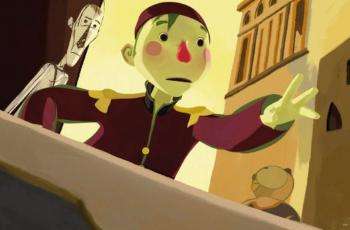
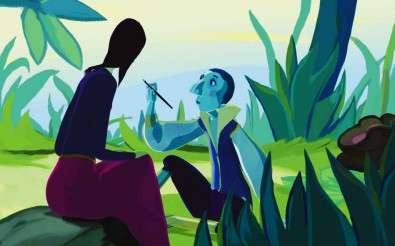
RAMO GETS TO TOUCH UP HIS BELOVED'S FACE BECAUSE SHE'S A PASFINIE
Last edited by Chris Knipp; 02-17-2012 at 05:52 PM.
-
Jalil Lespert: Headwinds (2011)
JALIL LESPERT: HEADWINDS (2011)
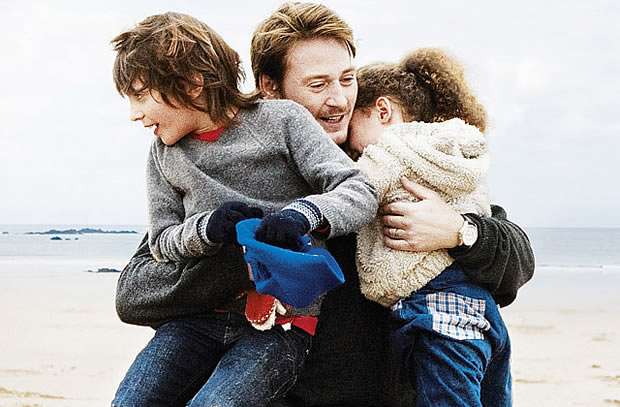
BENOÎT MAGIMEL WITH HUGO FERNANDES AND CASSIOPÉE MAYANCE IN HEAD WINDS
Trouble resolved in Brittany
Jalil Lespert is the star of two of my favorite contemporary French films, Laurent Cantet's 1999 labor union drama Human Resources and Xavier Beauvois' emotional 2005 policier, Le petit Lieutenant. He's a powerful actor. A 36,he's already establishing himself as a director. This is his second performance in that other role.
In this quietly tumultuous little film, Paul Anderen (Benoît Magimel), a writer, fights with his doctor wife (Audrey Tautou), insisting that she take care of the house as well as her hospital duties so he can write, but she's fed up and voilà! she disappears without a trace -- leaving him with two adorable and vulnerable little kids. His life shattered, after a year of hoping in vain that his wife will be found, forced to go back to zero, Paul retreats from Paris to his childhood home in Saint-Malo, in Brittany, where his older brother Alex (Antoine Duléry) sets him up with a place to live and work as a driving instructor. Then he screws one of his first students, the pretty, flirty young Justine (Marie-Ange Casta). And he takes in a jobless, homeless man (Ramzy Bedia) who steals his kid from school. The cops and the mother (Lubna Azabal of Incendies) are not too pleased. This is not so good because when hiw wife first disappeared, he was a suspect. He also befriends a man who's lost his job and license for running over a kid on a bike at night (Bouli Lanners). Paul must deal with the passive-aggressive officiousness of the local police chief (Isabelle Carré).
Des vents contraires, the bestselling novel this is based on by Olivier Adam (who collaborated with Lespert, Marion Laine and Marie-Pierre Huster on the screenplay), clearly chooses to throw the works at its sensitive yet durable protagonist and Magimel has to be a kind of damper: he absorbs, and the noise stops till something new comes along to challenge him. Clément and Manon (Hugo Fernandes and Cassiopé Mayance), the two kids, fare surprisingly well. One of the story's points seems to be that the French social safety net is too intrusive at times and the police investigations, school administrators, and therapists ought to mind their own business.
An older woman comes along to learn to drive, an admirer of Paul's books (Aurore Clément), who gives him her big house at a very reasonable rent. There is resolution, and life begins again.
The criticism is that this is a TV movie, a very good one, but a TV movie. Magimel is soulful and appealing; you may wish you had his rueful smile, his quiet intensity. At 38, he has already had a formidable career, winning the Best Actor prize at Cannes for his work with Isabelle Huppert in Haneke's Le Pianiste at 27 and a regular for the late Claude Chabrol. Nice restrained music here by David François Moreau (with a minute of wild rap by DJ Pone), and creditable lensing by Josée Deshaies. I like the way Lespert varies his tone. This is not all gray as some seem to think.
Headwinds/Des vents contraires, with its wintry gray Breton setting, opened appropriately in Paris in mid-December 2011, to generally favorable reviews (Allociné 3.1). There were a few dissenters: Cahiers du Cinéma found it taking shelter "under a gray smile," too cowardly "to work with fire and ice." Lespert may still be a better actor than director, but he knows how to find the best actors and work with them. The scenes with children are natural and sometimes fun. Headwinds opened in UK cinemas Februarly 17, 2011. The film is included in the March 1-11, 2012 Film Society of Lincoln Center-UniFrance collaboration, the Rendez-Vous with French Cinema. Public screening schedule:
Tues., March 6, 6pm – IFC; Thurs., March 8, 4pm – WRT; Fri., March 9, 6:15pm - WRT
Tues., March 6, 6pm – IFC; Thurs., March 8, 4pm – WRT; Fri., March 9, 6:15pm - WRT
Last edited by Chris Knipp; 05-26-2014 at 06:51 PM.
-
Philippe Lefebvre: Paris by Night (2012)
PHILIPPE LEFEBVRE: PARIS BY NIGHT (2012)

ROSCHDY ZEM AND SARA FORESTIER IN PARIS BY NIGHT
Weiss of Vice
Roschdy Zem plays Commandant Simon Weiss, pronounced "Vice," and he works for the Paris police vice squad. For this evening's tour of duty he is joined by a new policewoman signed up for the evening to be his driver in a posh Peugeot as he makes the rounds of clubs and checks up on various contacts. Is he an honest cop? In this particular department isn't that an oxymoron? Weiss clearly is a fair dealer, but that's another story. Does he apply the law, or simply the highest standard of the Parisian gangster code? We watch Paris by Night for Zem's suave, austere performance. We wish the screenplay didn't wind up with a surprise ending that leaves us flat.
Philippe Lefebvre is reportedly the maker of two creditable thrillers during the Eighties (Le Transfuge and Le Juge). After twenty years working in TV, he has returned to the big screen with a creditable, if slightly disappointing, noir about a solitary Paris vice squad cop (played by French veteran Zem) and his driver for the evening, Laurence Deray (Sara Forestier of last year's The Names of Love). The French title is Une nuit, "A Night," and this is a movie that scrupulously observes the unities and noir's preference for darkness. The black is lightened, however, by the use of digital cameras. These enable filmmakers to work inexpensively (no elaborate lighting setups) and seamlessly (no pauses to reload cameras). They also give the kind of glittering look we see in Michael Mann's gangster movies (notably in Collateral, mentioned as a model by the filmmakers, and Public Enemies). The Paris press has favorably spoken of the result as in the spirit of noir classics by Jean-Pierre Melville, this film being perhaps comparable to Alain Delon in Melville's Un flic/A Cop. But Un flic is not the best of what Delon and Melville did together.
This Michael Mann-style digital noir gives us glitter. We can see everything. The digital camera opens up the shadows, and that's remarkable. But it lessens the mystery. And it robs us of those velvety blacks. This isn't black and white. There is a lot of brown. There is realism of factual detail too, so we're told: police insiders were extensively consulted. But that is a mixed blessing. Where is the myth? Where is the magic?
The action takes us with seeming randomness from one night spot to another as Weiss doles out addresses to Deray, and a kind of plot emerges, or a laundry list of complicated involvements and events. In the course of a night's work, Weiss smashes up a bar; force-feeds a dealer heroin (not to mention a transvestite's poodle, which inadvertently OD's); sends Jerôme (Baptiste Amann), son of Weiss' longtime friend Tony Garcia (Samuel Le Bihan) to his mother for protection after getting him off coke-dealing charges. In several meetings, one presided over by the excellent Richard Bohringer (Gorodish in the 1981 classic Diva), he negotiates the opening of a new nightclub, which is in violation of various codes, with leading underworld figures. There is a lot of fuss over Tony Garcia's lawyer, Paul Gorsky (Gégory Fitoussi), who has screwed his friend in more ways than one. But I give away too much. Except that none of it matters quite enough, because it's in the nature of the screenplay that these events are a series of tableaux. What counts are the personalities, and so the highlights are only two: the scene between Garcia and Weiss early in the morning, when Weiss drinks too much Scotch and home truths are exchanged; and the meeting between Weiss and his driver in the light of day. It is nice to see Zem and Forestier sitting in a police office talking it all over. "I am not dangerous," Weiss says. "My job is." Indeed. One can't imagine a scene -- or two protagonists -- of such simple elegance in an American cop flick. But one longs for something more tragic and vital.
Zem's craggy, stoical mug -- he could be a taller, slimmer, Arab version of Jean Gabin -- is well suited to cop flicks and he has been in many. He has a toughness and elegance that suits him to a kind of passing on of the mantle -- but who could assume the mantle of the young Delon, or of Melville in his prime?
Paris by Night/Une nuit opened in Paris cinemas January 4, 2012, and got very good reviews (Allociné 3.8), though it seems to have been passed over by some of the more cinephile publications. The Mann-ish night images are a pleasure; so are the performances; the classic fatalism is gone, though fans of French film noir are welcome to come and look for it. This may not be one of the great ones, but it's still a good watch.
This is included in the March 1-11 joint Film Society of Lincoln Center and UniFrance presentation of the Rendez-Vous with French Cinema.
Public screenings schedule for Paris by Night in two New York locations during the Rendez-Vous:
Mon., March 5, 4pm & 8:30pm – WRT; Tues., March 6, 10:10pm - IFC
Last edited by Chris Knipp; 02-20-2012 at 05:53 PM.
-
Delphine Gleize: Moonchild (2011)
DELPHINE GLEIZE: MOONCHILD (2011)
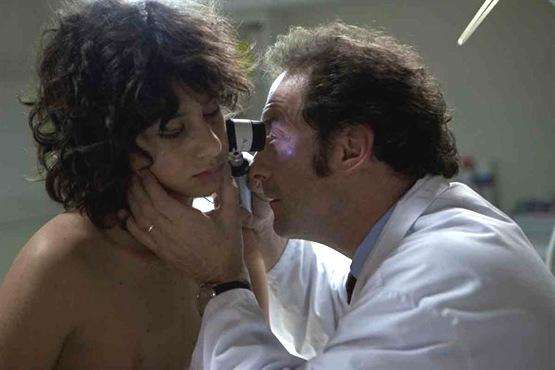
QUENTIN CHALLAL AND VINCENT LINDON IN MOONCHILD
A patient and his doctor who must part
Moonchild/La permission de minuit is a medical tale that avoids the usual dangers of such tales even as it risks being stereotyped anyway. This is one of a number of stories (there was a film in 1988 in which Brad Pitt was the victim) about someone with the rare genetic disorder of xeroderma pigmentosum (XP). It occurs in only one in a quarter million in the US; more in Europe; six times that in Japan. In XP the body's ability to deal with the effects of ultraviolet rays is severely disabled. Fewer than 40% with the condition live beyond the age of 40; many get severe cancers before they're 20. Delphine Gleize's film handles this subject with delicacy and tact. Finally her subject is only partly the disease and more particularly the adolescent patient, his faithful longtime doctor, who goes through a big transition in his career, and the fraught relations between the doctor and the boy.
Here the patient with XP is is a 13-year-old called Romain (newcomer Quentin Chalal), who is "cool" (by his own declaration), energetic and tousel-haired. Romain likes girls and rugby and surfs in the moonlight, and, of course, since it's safe for him at night, he can go to parties. But he can't play night rugby with his pals because the playing field has UV lights. And he must be constantly checked, use a UV-reader to monitor the light safety even of indoor spaces, and wears a hood and mask and gloves when he goes out in the daytime.
Romain clearly wants to live life to the fullest he can. He wants pals, he wants parties, he wants a girlfriend, and he wants to make love, and he gets all that. but aside from his banishment from the light, he is otherwise isolated. His father split when he was diagnosed as a small child, and David (Vincent Lindon), his doctor, has taken on the role. They are very close. Perhaps Romain is the most important relationship in David's life. David is a bit of a workaholic, sometimes not very present for his wife (Caroline Proust).
With his stylishly wild mop of long hair and his springy athleticism Challal radiates a naturalness and spirit that save Romain from ever seeming the least pathetic, though he's allowed the occasional moment of fatalism about his condition. Lindon is as soulful and solid as usual. But David doesn't handle everything so well. He's been offered a significant post in his specialty with WHO in Belgium that he applied for twelve years ago, and he's leaving, but he doesn't know how to tell Romain about this. When the boy gets the news indirectly from his mother after an outing with David he becomes furious. He turns against David. The moment of cowardice is an excuse for lashing out at all he's angry about, both his condition and his sense of abandonment.
The new doctor replacing David is Carlotta (Emmanuelle Devos), whom Romain willingly switches to, partly to hurt David. The relationship between David and Carlotta itself is fraught. David isn't really ready to go, and he takes it out on Carlotta.
Lindon is always a pleasure to watch, and there is some similarity to his role in Philippe Lioret's Welcome here: again he's a middle-aged man in crisis guiding a youth through worse. Devos too is always fascinating and complex, and her Carlotta shows class and grace in handling David's clumsy turning over of the reins. The last third of the film is dedicated to smoothing things out. Ultimately it's all about moving on.
La Permission de minuit was released March 2, 2011 in France and received generally good reviews for its taste and good acting (Allociné 3.4), but with some dissenters among the more hip who thought this a conventional bore, a TV movie; Les Inrockuptibles and Cahiers du Cinéma were particularly cruel. This is unfair: Delphine Gleize studiously avoids pathos and melodrama. But her studiousness may call too much attention to itself. An incurable medical condition is an elephant that will dominate any cinematic room.
Included in the UniFrance-Film Society of Lincoln Center joint March 1-11, 2012 Rendez-Vous with French Cinema series. The public screening is:
*Sat., March 3, 2012, 9:30pm
*In person: Vincent Lindon
Last edited by Chris Knipp; 02-21-2012 at 02:38 PM.
-
Fréderic Louf: 18 Years Old and Rising (2011)
FRÉDERIC LOUF: 18 YEARS OLD AND RISING (2011)
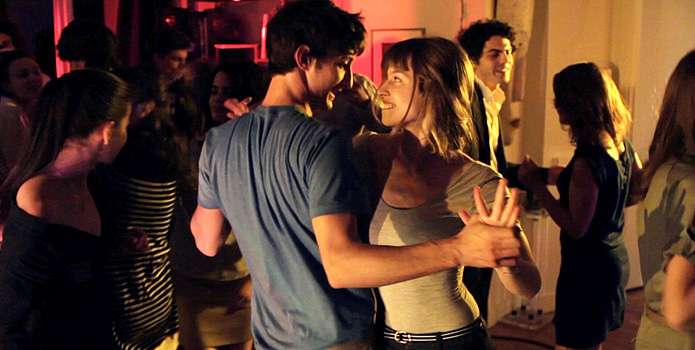
PIERRE NINEY IN 18 YEARS OLD AND RISING
Class comedy
Frédéric Louf's smart political comedy about the Upper Bourgeoisie in the time of Mitterand skewers both snobby rich kids and the working class boy who sets out to enjoy them and then falls for a self-centered girl. The laughs are physical as well as witty and dominated by the Comédie-Française's skinny, nimble, talented youngest male member Pierre Niney as Primo Bramsi, a supposed school failure with dash who despises his provincial florist father and neglects to pay the rent on his tiny Parisian chambre de bonne -- but keeps bouncing back and surprises his prof by passing his bac.
Primo isn't political. He's a free-wheeling, picaresque character, almost a Felix Krull, who will say anything to get ahead. Watching him improvise is a giddy pleasure. Coming back to Paris after a short, disastrous visit to his parents, he crashes a party given by some snobby rich Parisian kids and though his shoes fall apart, the girls fall for him. He falls hopelessly for the insufferably self-centered Gabrielle (Lou de Laâge), though it's the quirky Delphone (Audrey Bastien) who may want him the most. Gabrielle does invite Primo to summer with her and her family in Saint-Tropez, but she quickly disinvites him when he gets beaten up by some right wing toughs and the bruises on his face make him look like a raccoon. Appearances are everything for these silly young snobs.
Louf, who co-wrote (with Régis Jaulin) and directed this debut romantic farce, heightens the sociopolitical emphasis by setting its events in 1981 when the socialist François Mitterand is just getting elected President, beginning a 13-year period when the communists were invited into the government and the right wing was in a continual state of alarm and outrage. Primo's pal at his building is a young Arab with natural leftist leadings called Malik (Ali Marhyar) who has told him to vote for Mitterand, but that never happens, though Primo's friendship with Malik survives his flirtations with the pampered rich.
After being banished by Gabrielle, Primo is invited back by Gabrielle's rich boyfriend to a wine party for which Primo blows all his rent money, 1800 francs, for a bottle that will impress her friends -- he gets a 1961 Chateau La Conseillante, which is worth $2,700 today. But when Malik is shocked at this waste Primo opens the bottle and drinks it with Malik up on the roof, later refilling the bottle with 10-franc plonk from the supermarket to take to the party. The rich boys know it's not La Conseillante because Malik threw away the cork, but are fooled into thinking it's good stuff.
Part of the fun of 18 Years Old and Rising is the way Primo keeps getting away with everything: it's a celebration of the durability and sociopolitical flexibility of youth, and Neney (who has a droll cameo in Guédiguian's new film, also in the Rendez-Vous, The Snows of Kilimanjaro), seems made of shape-holding rubber. His character jumps into fistfights at a moment's notice and often threatens to jump out of windows, which he occasionally makes good on. He accordingly spends much screen time all bruised or limping. But the real victims are the rich kids whose received prejudices are continually skewered. Miriaculously and rather inexplicably, Primo passes his bac and his philosophy prof stands him to a bottle of good champagne. Both of the rich girls still seem to like him, his Arab friend doesn't hate him and the rich boys keep looking sillier and sillier. If you're leanings are anti-youth or pro-money, none of this is going to taste very sweet.
The combination of politics, history, and romantic comedy is reminiscent of last year's French US art house hit, Michel Leclerc's The Names of Love, which substitutes for the victorious Mitterand the defeated Lionel Jospin and is set twenty years later and whose nimble comic is a female one, Sara Forestier. Leclerc's film is more layered, but Louf's is purer, simpler fun. Premiere compares Niney to Louis Garrel, and he does resemble Garrel's more madcap, crazy side, only skinnier. Niney was nominated for the Jeune Espoir Masculin (Most Promising Male Actor) award at the 2012 Césars for this performance.
Suiting its wild summer mood, J'aime regarder les filles opened in Paris July 20, 2011 to fair reviews (Allociné 2.9): some didn't get the joke. The film has also aired at several festivals, including Toronto in September 2011.
The French title is taken from Patrick Coutin's 1981 hit. The film is included in the March 1-11, 2012 joint UniFrance and Film Society of Lincoln Center series, Rendez-Vous with French Cinema. Public screenings will be:
Mon., March 5, 6pm – IFC; *Sat., March 10, 3:45pm - WRT
*In person: Frédéric Louf
Last edited by Chris Knipp; 10-12-2020 at 10:13 PM.
-
David and Stéphane Foenkinos: Delicacy (2011)
DAVID AND STÉPHANE FOEKINOS: DELICACY (2011)
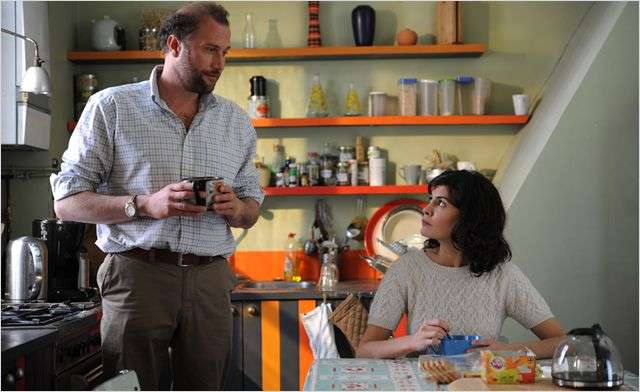
FRANÇOIS DAMIENS AND AUDREY TAUTOU IN DELICACY
A widow's quirky romance
Audrey Tautou stars in this melodrama-as-rom-com about a recent widow who gets involved with a seemingly inappropriate coworker. The screenplay slowly introduces this situation through a host of drawn out and calculated set-up scenes. The point is to dispose of the husband so the bereaved wife can fall into her confused affair. Delicacy seems to mean taking a very long time to get where a classic comedy would take us in a jiffy. Perhaps something has been lost in the translation by these first-timer brothers of David's bestselling novel. Anyway for some reason it's necessary to have a full-fledged meet-cute with soon-to-be-gone hubby François (Pio Marmai) and Nathalie (Tautou) -- it involves his voiceover and her choice of apricot juice at a café. Then he proposes -- using a key ring as a pledge. Then there has to be a wedding in the snow captured in a whirling dolly shot. The cute voiceovers continue with a (mercifully) quick scene showing the pair, legally a couple now, in bed. No baby yet, they decide -- that would doubtless hamper the widow's romance, though the decision to delay children unwittingly underlines the fact that Tautou is not so young as she used to be. It's over a decade since her success in Amélie. Hasn't her ticket on the ingénue train expired by now?
Finally François goes out for a jog. At last! He's going to get killed. Only not quite. First there must be a pointless hospital sequence. But now last he's out of the way and the story can begin.
Nathalie puts her life back together, only just: her job interview with the Swedish-based company she's going to work for involves a pointlessly predatory boss, Charles. He's played by the usually sultry and mysterious Bruno Todeschini, miscast here as a blatant bore. He will persist in pursuing Nathalie despite her declared lack of interest, and will tell another coworker that she's a real Yoko Ono, capable of breaking up the world's biggest rock group. This is the movie's concept, which it attempts to foist upon us. The action does not bear this out. No one is interested in Nathalie, except Charles, and maybe, a shlubby Swedish guy. Several years inexplicably pass, and Nathalie inexplicably grabs the Swedish guy, Markus. He is played by the excellent François Damiens, the first cast member allowed to introduce a little nuance. Markus is an oddball, because he's not handsome or pretty like Nathalie, François and Charles, and he's weird, because he's Swedish.
No worries, because Markus speaks perfect French, not surprising since Damiens (recently seen in Heartbreaker, with Romain Duris) is Belgian. Nathalie gives Markus a French kiss, and then the confusion can begin.
But what is the confusion? It seems to be general, but so unfocused it's hard to care about it. Nathalie tells Markus she was thinking of something else, and has no idea why she kissed him. Nonetheless they start dating. He thinks he may be falling in love with her, or will soon because it's Paris and the Eiffel Tower is right behind them flashing those sparkly lights at night, another one of the movie's predictable, manipulative scenes. But he's also not sure he's in love with her and thinks maybe he shouldn't be. She isn't in love with him. But they go on dating. Charles finds out, and tries to intrude. Is that, and his drunken evening with Markus, supposed to be funny? This is really hard to say.
Delicacy/La Délicatesse -- or its story -- may deserve credit for attempting to be different, and even for suggesting romance need not be with a handsome, prepossessing guy (Markus does however repeatedly show that he has a good sense of humor). This is a good role for François Daniens (how, though, can we imagine him to be Swedish?); but one actor worth watching in a film is not quite enough. One must still make allowances (though the film's look is quite classic and glossy) for these first-timer Foenkinos brothers' making some missteps in telling their already successful story. There are blatantly derivative moments, including a bereaved street song for Nathalie that's a tepid echo of Honoré's Love Songs. But this still seems a film that's often tedious and inexplicable. From the start it indulges in button-pushing, it pushes its quirkiness too hard (nothing "delicate" about either of these), and it has a shaky sense of pace. It seems the filmmakers were not sure enough of themselves. None of this seems to get in the way of popular box office success, necessarily. La Délicatesse has been well received in France -- it opened there just before Christmas 2011 -- though the critics did not love it very much (Allociné 2.5 indicates mediocre reviews).
Delicacy is the closing night film for the March 1-11, 2012 joint UniFrance and Film Society of Lincoln Center series, Rendez-Vous with French Cinema. Two screenings at that time:
*Sun., March 11, 6pm & 9pm - WRT
*In person: David & Stéphane Foenkinos and Audrey Tautou
A UK release is scheduled for April 12, 2012.
Last edited by Chris Knipp; 02-21-2012 at 08:58 PM.
-
Lucas Belvaux: 38 Witnesses (2012)
LUCAS BELVAUX: 38 WITNESSES/38 TÉMOINS(2012)
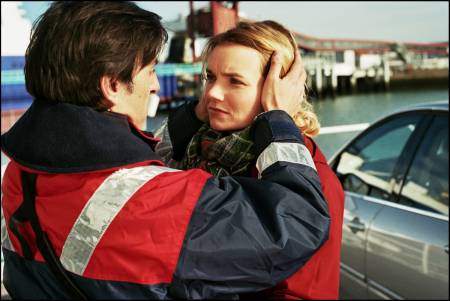
SOPHIE QUINTON AND YVAN ATTAL IN 38 WITNESSES
Bad witnesses
Lucas Belvaux's Rapt, starring Yvan Attal, considered the moral ironies in a rich executive's kidnapping when his bad prior behavior emerges. In 38 Witnesses/38 Témoins the Belgian-born director known for his brilliant multi-genre Rashomon-style Trilogy tackles another moral issue. He adapts a novel by Didier Decoin, Est-ce ainsi que les femmes meurent ? ("Is This How Women Die?") based on the 1964 Kitty Genovese case of the woman in Queens whose rape and murder 38 witnesses were aware of but never called to report. The setting has been moved to Le Havre -- not the quaint, humanistic version given us in Aki Kaurasmäki's recent film, but anything but. Belvaux's filmmaking here is severely elegant, with some small sense of imploding Greek tragedy in it. And yet it's hard to care, and some of the emotion seems pushed. This Le Havre is gray and off-putting in harbor, building, and street, the objective correlative of soullessness and a frozen moral sense. While Rapt was an intense thriller, 38 Witnesses (again starring Attal) is rather static, a long wait to find out that people didn't do anything, which we already knew. It's a grim, depressed film, impressive but without emotional impact. Belvaux has a great command of style, but one begins to see a cool indifference in his work.
Belvaux's digital widescreen images of cold-colored harbor industrial spaces and big cargo ships and a pilot boat roaring through a wintry sea are grand and terrifying and beautiful. They made me think of the much more layered and complex Adieu by Arnaud des Pallières, which also deals with moral responsibility (it combines the issues of Rapt and this and much more). Belvaux's shipping images, which show the power of the sea and of freight vessels, exude a sense of helplessness, especially through the effective use of sound design, which makes water and engines oppress us and seem alive -- more alive than any of the people in the film.
Pierre (Attal) is a harbor pilot, and he works at night; he lives in a spacious flat, gray like everything else, with big windows. It overlooks the place where a girl was brutally murdered. Her screams rang out. One man heard them and yelled; he is the only one at first who admits to police that he saw. Pierre's fiancee Louise (Sophie Quinton) works in shipping too, but she returns from a trip to China at the end of the fatal night.
The local journalist exploring the case, Sylvie Loriot (Nicole Garcia, as good as she can be in a conventional role) comes to question people, but at first only Louise will talk to her. Louise assumes Pierre didn't hear the violence, as he at first claims. But he has a doomed, grim look. He predicts the end of their relationship. It's all over before it's begun.
Everything in the film goes like this. It's all a foregone conclusion. What are we here for? To have the witnesses' cowardice and lying revealed. But we already know about them. To brood over the wrongness of it all.
On another night the increasingly desperate, guilt-ridden Pierre (who does he think he is, the murderer?) delivers a painfully overwrought, though whispered, soliloquy as he sits near the sleeping Louise that in effect finishes off the film by removing whatever element of naturalism or dramatic truth it might have contained. It may have seemed necessary to explicate his sense of guilt at having heard everything and gotten up and looked and then still done nothing, but the whispered speech exemplifies 38 Witnesses' art-film lack of realism and ordinary detail. Everything is grandly, coldly staged; nothing is naturalistic and specific. Is this what Belvaux has always done? The cold relentlessness worked splendidly in Rapt, but here, it's the kiss of death, because we need to see little people feeling guilty and responsible. Instead we get a grandiose sense of doom.
Louise is sleeping but "hears" the soliloquy and thinks it's a dream, but Pierre confesses it's true. His next step is to go to the police. The commissioner's first choice is not to do anything because there are too many guilty people to prosecute. But then an uneasy cop (François Feroleto) tells Sylvie and she writes the silent witness story. This forces the cops to go back to the people in the building, who admit they had lied when they said they heard nothing. The cops stage a "recreation" of the crime and the witnessing of it and then Louise, who had pledged to stay by Pierre, announces that she is leaving him.
Belvaux is at the top of his game, but in things that don't matter. A frantic drive around the port by Louise looking for Pierre is superfluous, but has terrific rhythm and visual style. A man alwyas staring at Pierre from a balcony across the street is silly but elegantly shot. But these are pointless gestures, and the essential is missing. A curious casualty of the storytelling is the police procedural aspect, which is barely touched on -- except for the few final minutes, which are terrifying and yet somehow seem thrown away, almost an afterthought, an obligatory gesture and nothing ore, however well done.
The stars of 38 Witnesses, despite the well-meaning efforts of Nicole Garcia and Yvan Attal, are the great container ships and the dockyard cranes and the big apartment buildings with their disquieting spaces and sounds, the digital cameras with their excellent lenses manned by dp Pierric Gantelmi d'Ille, and the mikes manned by Henri Morelle that have caught the sounds of the sea and engines and cries of the victim and someone reenacting her final ordeal.
38 Témoins will be released in France March 14, 2012. It debuted at Rotterdam, where it was the opening night film, and was screened for this review at the Walter Reade Theater at Lincoln Center in preparation for the UniFrance-Film Society of Lincoln Center Rendez-Vous with French Cinema, where it will be shown to the public three times at two locations, the IFC Center and the Walter Reade Theater:
Fri., March 2, 7pm – IFC; Sat., March 10, 6:15pm – WRT; Sun., March 11, 1:30pm – WRT
Last edited by Chris Knipp; 09-28-2015 at 05:49 PM.
-
Laurent Achard: Last Screening (2011)
LAURENT ACHARD: LAST SCREENING (2011)
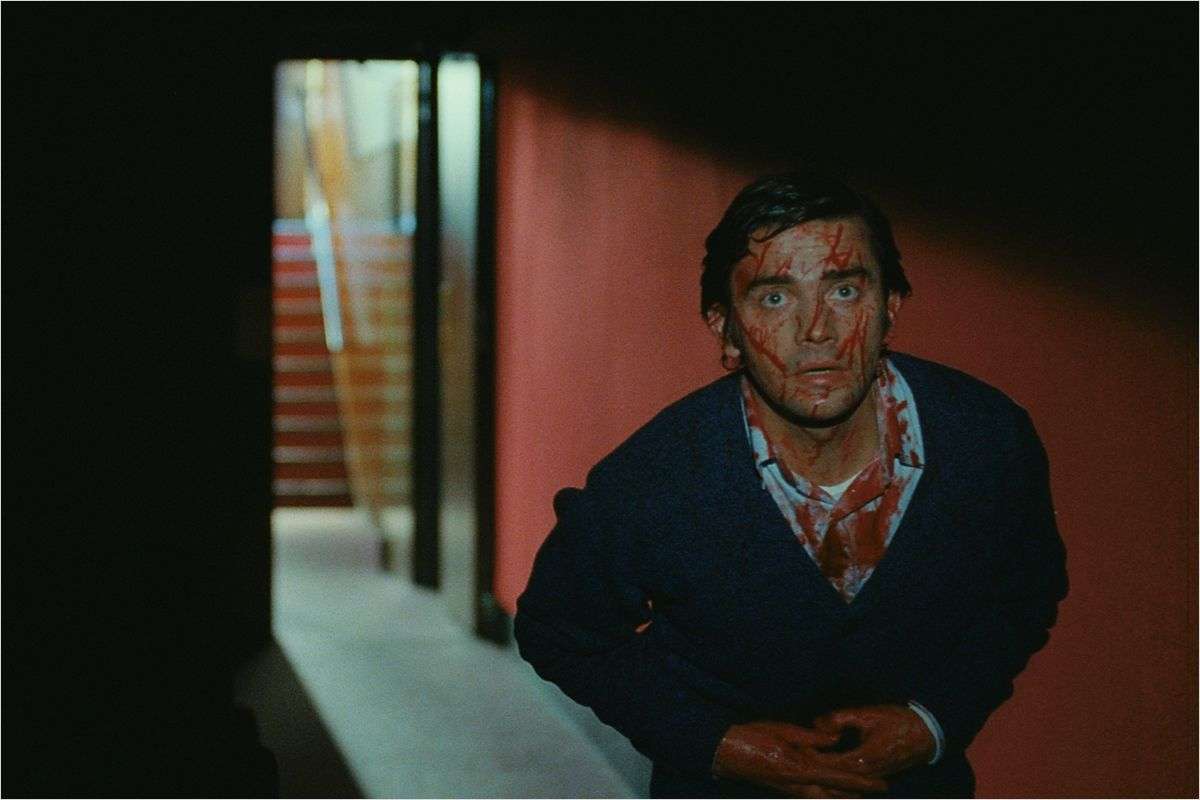
PASCAL CERVO IN LAST SCREENING
Auteurist slasher film
In Laurent Achard's third feature, Sylvain (the sweaty, haunted-looking and quick-to-tear-up Pascal Cervo) runs a small provincial French rep cinema and lives in the basement, a hiding place for piles of cinephile mementos that once belonged to his mother. In his spare time he murders women and cuts off their ears, complete with earring, to adorn old star photos tacked on his walls. But maybe this should not be taken to literally. As Variety critic Leslie Felperin comments, Dernière séance "plays like a private joke best shared among movie buffs." The real aim is not to tell a horror story so much as to riff off of Peeping Tom, Psycho, and various other cult films, to create a strange amalgam of art film and sleazy slasher flick. "Cinema Paradiso meets Psycho" is the rather random series blurb phrase. One may be reminded of other films about movie houses, such as Jacques Nolot's gritty and personal Porn Theater or Federico Veiroj's gentle, humanistic A Useful Life, in which the cinema is also threatened with closing. Last Screening is a perfect effort for late night hipsters, but mainstream art house clients will be horrified if they wander in. In France it appealed most to the critics for the cinephile mags, Cahiers du Cinéma and Les Inrockuptibles. The latter saw it as a blend of Argento and Bresson.
Sylvain's Empire Cinema is about to be closed down. The owner, who redid it in 1978, is going to turn it into a shop and Sylvain has to move out. The implication is that this crisis causes Sylvain to go off the deep end and begin his series of murders, losing all ability to distinguish between reality and the films he loves, and entering into his own B-horror sequence. Meanwhile he avoids harsh reality by continuing to show one film a day, running the projector, selling the tickets, and cleaning the seats afterward and letting in a handful of loyal customers such as Monsieur Paul (Noël Simsolo and a woman playing the lead role in Racine's Phèdre, Manon (Charlotte Van Kemmel), who has a romantic interest in him. In his free time he roams around killing young women. Sometimes older ones, like the female cabbie he encounters at a kind of karaoke theater, played by Brigitte Sy, former lover of Philippe Garrel and mother of Louis Garrel. She drives Sylvain out to the suburbs to the house where he grew up. Then he offs her.
Before this Sylvain, who usually dons a hooded coat for his exploits, offs a drum majorette practicing in a stadium and various others. Overwrought flashbacks show young Sylvain (Austin Morel) and his brutal mother (Karole Rocher), who's harshly running him through some memorized lines for what may be an audition. "Mamon dearest" (to use Felperin's line) evidently is the cause of both Sylvain's hatred of women and his obsession with classic female stars. One of Sylvain's victims finally gets the better of him and as he dies of stab wounds, he staggers through the projection room and manages to watch the last scenes of Jean Renoir's French Cancan, the film he's most recently been screening for customers for six euros.
The Last Screening debuted at Locarno (August 2011) and played at London and other film festivals, including Rotterdam (January 2012). It opened in Paris cinemas December 7, 2011 to rather mediocre reviews (Allociné 2.8) overall; but many critics acknowledged that Achard has a distinctive style and that his blend of auteurist/cinephile and horror themes is unique and "bears fruit." The film is included in the UniFrance-Film Society of Lincoln Center March 1-11, 2012 series, Rendez-Vous with French Cinema, and was watched for this review at a press screening at Lincoln Center. Public screenings at the Rendez-Vous will be:
*Tues., March 6, 8:30pm – WRT; *Thurs., March 8, 6pm – IFC; *Sat., March 10, 1:30pm – WRT
*In person: Laurent Achard, Pascal Cervo and producer Sylvie Pialat
 Posting Permissions
Posting Permissions
- You may not post new threads
- You may not post replies
- You may not post attachments
- You may not edit your posts
-
Forum Rules





 Reply With Quote
Reply With Quote
















Bookmarks